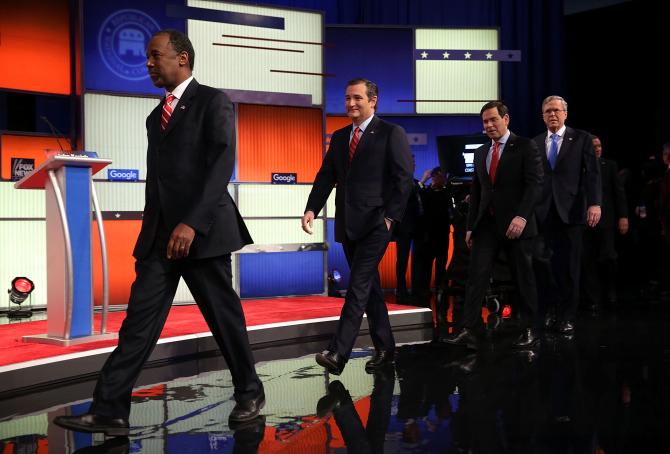[ad_1]

Republican presidential candidates Ben Carson, Ted Cruz, Marco Rubio and Jeb Bush walk onstage prior to the start of the Fox News-Google GOP debate Jan. 28, 2016, in Des Moines, Iowa. Donald Trump decided not to participate.
Alex Wong/Getty Images
Even when you know a show is about an ensemble cast, there are still those who stand out. And when they’re not there, the entire show suffers. When Simon left American Idol; when Nene Leakes left Real Housewives of Atlanta; even way back when Toni left Girlfriends, you just knew the show just wouldn’t be the same, and usually, it was about to take a turn for the worse.
That was the feeling many Americans had going into Thursday night’s seventh and final preprimary debate for the Republican Party once it was clear that Donald Trump wasn’t going to show.
Did Trump’s absence make a difference? Did Marco Rubio make a leap? Did Ben Carson stay woke for the entire debate? Here are the three biggest takeaways from Thursday’s debate, and their implications for the first presidential caucus in Iowa next week.
In a fight that’s been going on since August last year, Donald Trump continued his Kanye-Amber Rose-like feud with Fox host Megyn Kelly, and used her presence as a moderator as an excuse to skip Thursday’s debate.
Trump’s political “bye week” was supposed to open up the door for the debate to be radically different from the previous six, but that wasn’t the case. There were only around three questions about Donald Trump at the beginning of the debate, and they were handled effectively by Rubio, Ted Cruz and, to a lesser extent, Chris Christie. After that, the front-runner was mostly out of the picture.
The candidate most affected by Trump’s absence was actually Jeb Bush. Bush seemed entirely unsure of what to do with himself without Donald Trump there to kick sand in his face and give him the chance to trudge along the moral high road.
The former Florida governor made more unprompted references to Trump in absentia than every other candidate onstage. It was almost like Bush was nervously expecting the GOP front-runner to pull a Vince McMahon and jump onstage at the last minute to body him again for old times’ sake. On a night when everyone else got the direct message that Trump wasn’t going to be there, Jeb Bush was still using cable.
Strategic Questions Dominate the Night
The penchant for “strategy” questions during primary or presidential debates is a problem that has been pervasive throughout this campaign season. If the candidates are already going to be split into “main stage” and “undercard” debates (a generally lousy idea) then the least moderators can do is treat everyone onstage like they have a legitimate chance to compete. Unfortunately, moderators still asked Cruz, John Kasich and others questions regarding their viability as presidential candidates as opposed to sticking with policy questions.
However, in Thursday’s debate, there was an additional wrinkle that was new and equally problematic. The moderators were protecting the front-runners like Rubio and Cruz from questions that would highlight some of their less-than-“electable” opinions on hot-button social issues.
YouTube questions about criminal justice, GOP Muslim rhetoric and social issues were thrown at candidates like Rand Paul or John Kasich—ones who either have fairly moderate views on these issues or who wouldn’t gain or lose any ground with their answers.
It would have been nice to see Ted Cruz discuss criminal justice, or Marco Rubio comment on anti-Muslim rhetoric from the party. There seemed to be a concerted effort to make sure they didn’t get any questions that might provide fodder for Democratic attack ads down the road.
No Quitters on This Stage
Many political analysts assumed from the start of the primary campaign that the GOP field (once as large as 17 people) would be whittled down to two, maybe three, candidates after Iowa, at the latest. However, if you watch the excellent campaign reality series The Circus: Inside the Greatest Political Show on Earth on Showtime, candidates filmed just days before this debate were pretty adamant about the fact that they weren’t planning to drop out anytime soon.
Obviously, some of that is posturing, like President Barack Obama pretending he doesn’t really care who wins the Democratic nomination, or Michael Bloomberg drunk-texting America that he really, really wants to think about running for president again.
However, there was no QVC-sales desperation on the stage Thursday. There was no one claiming that if you didn’t caucus for them right now, this campaign might not last another week. John Kasich spent every minute he could touting his endorsements and rising polls in New Hampshire, which suggests that no matter what happens in Iowa, he’s going to stay in at least one more contest. Chris Christie and Jeb Bush both sounded equally committed to the race with not a hint of fatigue or finality in any of their words. It’s hard to tell with Ben Carson since he was never really running for president, but it’s a safe bet that six out of the seven people onstage Thursday, plus Donald Trump, will be continuing their pursuit of the Republican nomination past Iowa.
[ad_2]





















